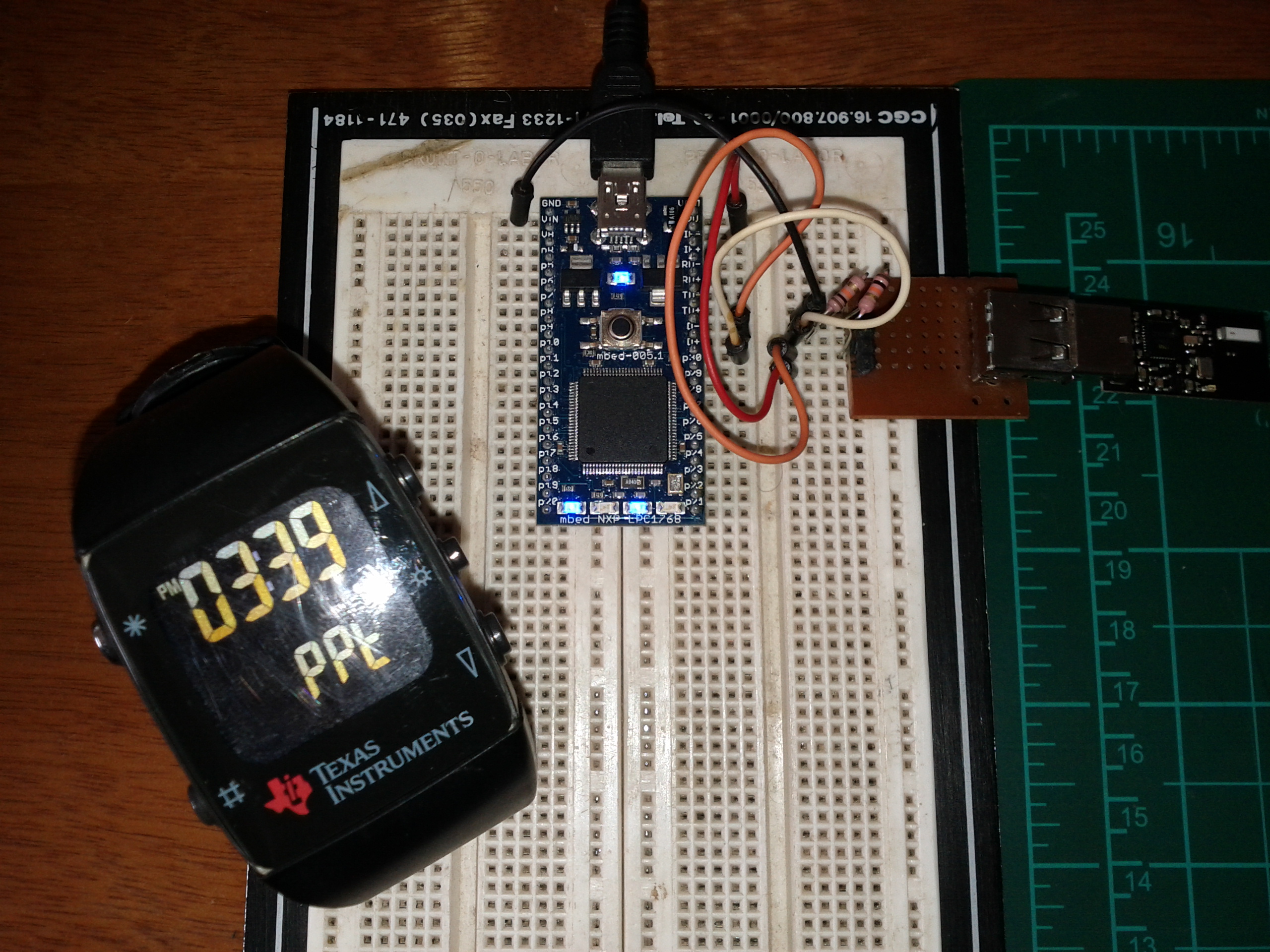This program is a initial connection test of mBed and Texas Instruments EZ430 Chronos Watch. The Chronos RF Access Point radio dongle is connected to mBed usb port , and it's configured as a usb host. The program uses the USBHostSerial library.
Chronos Test
- This program is a successful connection test between mBed and the watch EZ430 Chronos Development Tool from texas Instruments.
- The RF Access Point usb dongle, that comes with the watch, emulates a usb serial port when connected to a PC. I connected it to the mBed usb port , configured as host ( two 10 K ohms resistors from D+,D- to gnd , I know the recommended value is 15k ) and based the development on the USBHostSerial HelloWorld example program.

- The mBed leds are activated based on the button received from the watch : led2 goes on when the "*" button is pressed , led3 when the "#" button is pressed and led4 when the "up"button is pressed .
- In order to function , you have to select the "ppt control" mode on the chronos watch and after that , start the transmission pressing the "down" button on the watch.
Revision 1:461ba80810ce, committed 2014-07-30
- Comitter:
- jeroavf
- Date:
- Wed Jul 30 02:16:30 2014 +0000
- Parent:
- 0:54aa44094993
- Commit message:
- Excluding a redundant while (1) loop
Changed in this revision
| main.cpp | Show annotated file Show diff for this revision Revisions of this file |
--- a/main.cpp Wed Jul 30 02:07:46 2014 +0000
+++ b/main.cpp Wed Jul 30 02:16:30 2014 +0000
@@ -1,22 +1,23 @@
#include "mbed.h"
#include "USBHostSerial.h"
-
+
DigitalOut led(LED1);
DigitalOut led2(LED2);
DigitalOut led3(LED3);
DigitalOut led4(LED4);
Serial pc(USBTX, USBRX);
-int chronos_answer[10] ;
-
-void serial_task(void const*) {
+int chronos_answer[10] ;
+
+void serial_task(void const*)
+{
USBHostSerial serial;
-
+
while(!serial.connect())
Thread::wait(500);
-
- serial.baud(115200) ;
+
+ serial.baud(115200) ;
pc.printf("chronos init ...\n") ;
@@ -24,58 +25,58 @@
serial.putc(0x07) ;
serial.putc(0x03) ;
pc.printf("chronos init completed ...\n") ;
-
-
+
+
while(1) {
- while (1) {
+
+ // send read request to chronos
+ serial.putc(0xFF);
+ serial.putc(0x08);
+ serial.putc(0x07);
+ serial.putc(0x00);
+ serial.putc(0x00);
+ serial.putc(0x00);
+ serial.putc(0x00);
+ Thread::wait(15);
+
- // send read request to chronos
- serial.putc(0xFF);
- serial.putc(0x08);
- serial.putc(0x07);
- serial.putc(0x00);
- serial.putc(0x00);
- serial.putc(0x00);
- serial.putc(0x00);
- Thread::wait(15);
-
+ // put received characters on an array
+ int i = 0 ;
+ while (serial.available()) {
+ int c_in = serial.getc() ;
+ chronos_answer[i++] = c_in ;
+ }
+ int button = chronos_answer[3] ;
+ if(button != 255) {
+ printf("Button received : %d\n", button ) ;
+ switch(button) {
+ case 18 : // * button
+ led2 = 1 ;
+ led3 = 0 ;
+ led4 = 0 ;
+ break ;
+ case 50 : // up button
+ led2 = 0 ;
+ led3 = 1 ;
+ led4 = 0 ;
+ break ;
+ case 34 : // # button
+ led2 = 0 ;
+ led3 = 0 ;
+ led4 = 1 ;
+ break ;
- // put received characters on an array
- int i = 0 ;
- while (serial.available()) {
- int c_in = serial.getc() ;
- chronos_answer[i++] = c_in ;
}
- int button = chronos_answer[3] ;
- if(button != 255) {
- printf("Button received : %d\n", button ) ;
- switch(button) {
- case 18 : // * button
- led2 = 1 ;
- led3 = 0 ;
- led4 = 0 ;
- break ;
- case 50 : // up button
- led2 = 0 ;
- led3 = 1 ;
- led4 = 0 ;
- break ;
- case 34 : // # button
- led2 = 0 ;
- led3 = 0 ;
- led4 = 1 ;
- break ;
-
- }
- }
-
-
- Thread::wait(50);
}
+
+
+ Thread::wait(50);
+
}
}
-
-int main() {
+
+int main()
+{
Thread serialTask(serial_task, NULL, osPriorityNormal, 256 * 4);
while(1) {
led=!led;